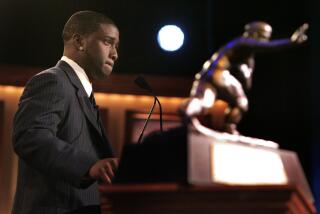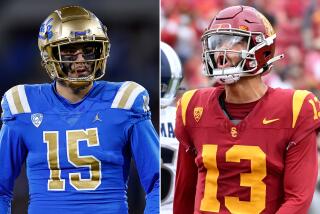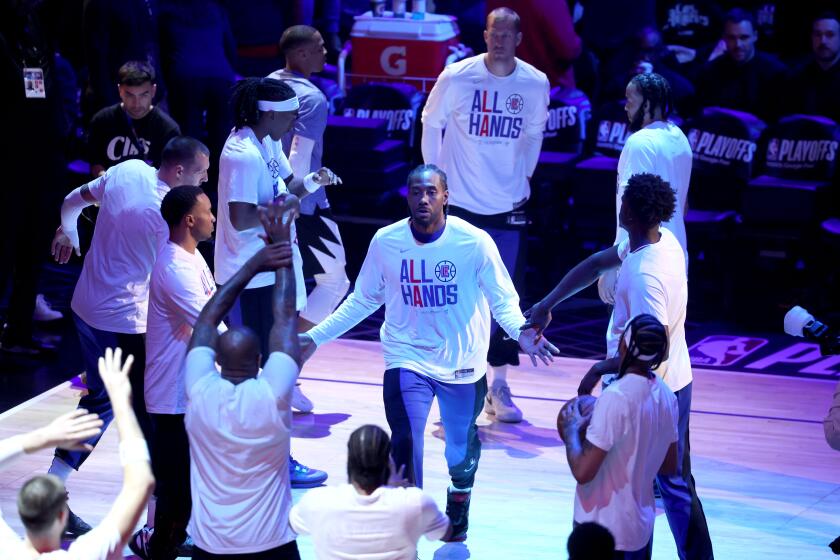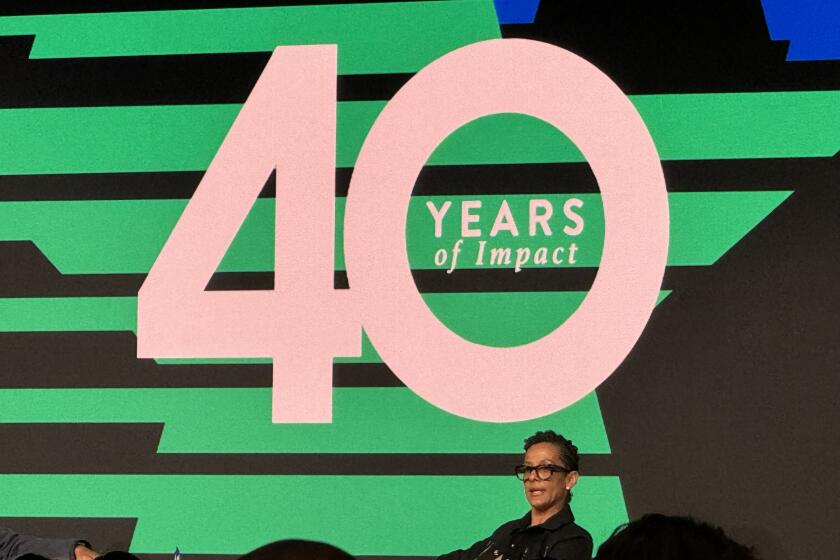Women’s game deserves more love from the fans
I hope, one day, I’ll have a daughter.
I hope she’ll be athletic, drawn to sports, maybe even very good at one.
But if this happens, if in two decades she’s in college and, for argument’s sake, a basketball star on an elite team, will she and her teammates still be second-class citizens in the battle for the hearts and minds of fans?
Unless we change the way we view women’s sports, I fear this will be so.
The NCAA women’s basketball tournament is unfolding, though you’re not alone if you’ve paid no attention. The women are headlined by the most dominant team on either side of college basketball’s gender fence: undefeated Connecticut.
But as always, the women are lost in the tall shadow created by the men and their March Madness grab for glory.
ESPN, to its great credit, gives the women’s tournament ample coverage no matter the ratings. The broadcasts, however, betray a sad reality: At many of the games, even the most important ones, there’s paltry buzz and far more empty seats than fans.
Consider the second-round tournament game between Virginia and California, played at USC’s 10,258-seat Galen Center. About 700 fans showed up.
Consider Maryland’s Sweet 16 game played in basketball mecca Raleigh, N.C. For one of the tournament’s best games, 3,000 fans were dwarfed by the spacious 19,722-seat RBC Center.
Consider that the first two rounds of women’s play drew an average of 4,100 fans. The men routinely quadrupled that.
There’s been low-level gnashing of teeth about all this. Among the excuses: The view that the women’s game doesn’t merit attention, and the hackneyed belief that women should be happy because their game is at least growing, albeit slowly.
Among the proposed solutions: move the tournament so it doesn’t compete with the men, and play all NCAA games on the favored team’s home court.
Hogwash!
Women’s college basketball is fine, high-caliber competition. It should be judged on its own merit and deserves greater attention.
The women’s game shouldn’t be happy with slow, incremental progress. Little else changes slowly in our Twitter-mad society. Why should this?
Moving the tournament or reworking the games to play them on home courts (something the men don’t do) is condescending. Instead, we need to look in the mirror.
We’re simply not ready to accept strong, aggressive women playing sports. And this is nowhere truer than when dealing with college basketball.
“We have a problem with women on teams,” said Jennifer Ring, a political science professor at the University of Nevada in Reno whose recent book, “Stolen Bases,” covers prejudice against women in sport.
“We’re phobic of women athletes; afraid of women who are big, strong and effective at competition. But this is especially true when it’s about women athletes on teams -- women focusing their effort on helping out their teammates, women doing whatever has to be done to help other women” -- instead of pleasing men, she added. “It conflicts with stereotypes we have about femininity.”
Well said, professor. There are fewer men in America than women, but chauvinism still reigns. Nowhere more than in sports.
The female athletes who gain the most acceptance must still conform to mainstream societal standards for being pretty, polite, sweet and sexual -- while usually plying their craft solo. There’s a reason the women most accepted, most fawned over, are tennis players. There’s a reason that in every other photo of Danica Patrick, she’s dressed in two ounces of clothing.
Additionally, when it comes to basketball and the NCAA tournament, race remains a factor.
Just as in the WNBA, a lot of the top performers in the college game are black, and a lot of them are dark-skinned. Sadly, frustratingly, wrongly, darker-hued African-Americans have always been subjected to stiffer discrimination than their lighter brothers and sisters. Remember, it was only two years ago that radio host Don Imus dug a ditch for his career by referring to the dark-skinned women of the Rutgers basketball team in a racist way.
Imus, I suspect, said what a lot of people feel, deep down.
Look, since this is a female issue we’re talking about, sexual sizzle matters in an outsized way, and that means skin tone matters, too. You’re kidding yourself if you think dark-skinned black women -- Candice Wiggins, the remarkable point guard on last year’s Stanford team, comes to mind -- are viewed in the same feminine, sexy way as their lighter counterparts. There’s a reason latte-hued Candace Parker is hyped as a star and a savior partly for her sex appeal, while Candice Wiggins is not.
In the sad-but-true-and-must-be-fixed file: If the NCAA women’s tournament were filled with performers who bore a strong resemblance to the blond, blue-eyed, pixie-like Anna Kournikova -- or if it simply featured teams stuffed with look-alike Candace Parkers -- you could count on it being much, much more popular.
But still not as popular as the men.
That’s because one last thing we struggle with is the need to unduly compare female athletes to their male counterparts. “The Lady Vols of the University of Tennessee couldn’t beat the Fairfax High boys’ varsity,” goes a common strain of thought. “So I’m not watching!”
But why do female basketball players have to constantly be compared to men? Can’t we simply appreciate both games on their own merits, especially now, when women are shooting, dribbling and passing in monumentally skilled ways? If we’re comfortable with hailing the women’s champion at Wimbledon without shaking our heads at the fact she couldn’t beat Rafael Nadal, why can’t we do the same at the highest levels of a team game like basketball?
True enough, all of this is tough, complicated, vexing, confusing. Soul searching must be done -- as much by the media and people like me than by anyone. Progress must continue, only at a faster pace.
I hope, one day, I’ll have a daughter who will become an athlete, maybe even a great college basketball player. And I hope her games will be fully and rightly appreciated -- precisely the way the women’s NCAA basketball tournament should be.
Right now.
--
More to Read
Get our high school sports newsletter
Prep Rally is devoted to the SoCal high school sports experience, bringing you scores, stories and a behind-the-scenes look at what makes prep sports so popular.
You may occasionally receive promotional content from the Los Angeles Times.







